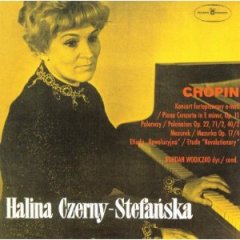Halina Czerny-Stefanska plays Chopin (2008)
Halina Czerny-Stefanska plays Chopin (2008)

1. Piano Concerto No. 1 in E minor, Op. 11: Allegro maestoso 19:44 2. Piano Concerto No. 1 in E minor, Op. 11: Romance, Larghetto 9:40 3. Piano Concerto No. 1 in E minor, Op. 11: Rondo, Vivace 9:37 4. Andante spianato and Grand Polonaise in E flat major, Op. 22 14:34 5. Polonaise in B flat major, Op. 71 No. 2 9:19 6. Polonaise in C minor, Op. 40 No. 2 8:00 7. Mazurka in A minor, Op. 17 No. 4 (encore) 4:00 play 8. Etude in C minor Op. 10 No. 12: Revolutionary 2:25 play 10. Mazurka in C major Op. 68 No. 1 1:48 11. Mazurka in A minor, Op. 17 No. 4 3:59 12. Etude in C minor Op. 10 No. 12 2:27 Halina Czerny-Stefanska – piano, Warsaw Philharmonic Symphony Orchestra, Bohdan Wodiczko – conductor. Recorded in Poland, 1957 (tracks 1-10, studio recordings), 1951 (tracks 11-12, live)
The Polish pianist Halina Czerny-Stefanska (1922 - 1982) enjoyed a more substantial reputation among piano buffs than among music-lovers in general until she was unexpectedly shot to prominence by a mistake that got her talked about all around the world. In the early 1950s she had performed the First Concerto of Chopin under Vaclav Smetacek in a recording issued by the Czech label Supraphon; when EMI reissued the performance in 1965 it was attributed to Dinu Lipatti, the Romanian pianist whose premature death in 1950 robbed classical music of one of its brightest stars. Not until the BBC broadcast the recording in 1981, exciting the suspicions of a sharp-eared listener, was the confusion discovered, fanning the flame of Czerny-Stefanska's then-fading international standing.
From 1935 to 1939 she was a student of Jozef Turczynski, renowned as a Chopin specialist, though she later confessed that she found him neither a first-rate pianist nor outstanding Chopin player. More important, she thought, were the lessons she had from Zbigniew Drzewiecki between 1945 and 1949. Drzewiecki she found particularly good at teaching the structure of a piece, though he was less concerned with detail. Czerny-Stefanska's career took off in 1949 when she won first prize - jointly with the Russian Bella Davidovich - in the Fourth International Chopin Competition in Warsaw (the first time the event had been held since the Second World War), and in the tensely nationalist atmosphere it assured her domestic standing, in effect, for the rest of her life. The Communist authorities bestowed honours on her, and as an artist of the state she went along with the Party line without argument. Her pact with the devil backfired with the advent of Solidarity, when she continued to support General Wojciech Jaruzelski, even after the imposition of martial law, and with the coming of democracy her status as a national figure was permanently undermined. Her musical importance was undiminished, though, and she continued to perform and to serve on competition juries around the world, including the Leeds, the Tchaikovsky (Moscow), Robert Schumann (Zwickau) and the Marguerite Long-Jacques Thibaud (Paris).
Her repertoire was narrow: although she performed the standard Viennese classics, the occasional Baroque piece and some carefully chosen contemporary composers, it is on her Chopin playing that her reputation will rest - and even within Chopin, she concentrated on a few central works: the C minor and D minor Polonaises, a handful of the Nocturnes, several of the mazurkas and the E minor Concerto which, surprisingly, she first performed with the full orchestral introduction with Sir Adrian Boult in London in 1951 (the F minor Concerto she didn't like and wouldn't play). James Methuen-Campbell, in his authoritative Chopin Playing (1981), found that her approach "is full of pathos and possesses rare maturity"; it had a "depth of concentration that few can manage", he said. "She finds inner lines and undercurrents in the C minor Polonaise that not even Rubinstein touches upon." Methuen-Campbell, who interviewed Czerny-Stefanska in Warsaw in 1978, found her somewhat conscious of her stature and austere in manner, despite her obviously dyed-blonde hair and, he suspected, several face-lifts. He wondered, too, whether she secretly admired the freedom with which the hotel pianist was playing - a sad irony if he was correct, since her entire reputation was built on the rigour of her Chopin. Czerny-Stefanska was highly regarded as a teacher, though, as an instinctual player, she was a less effective pedagogue than her husband, Ludwik Stefanski (1917-82), whom she sometimes joined in two- piano recitals; after his death she occasionally performed with their daughter, the harpsichordist Elzbieta Stefanska-Lukowicz. --The Independent (London)
download: uploaded anonfiles mega 4shared mixturecloud yandex mediafire solidfiles
Zmieniony (Czwartek, 03 Październik 2013 16:09)








